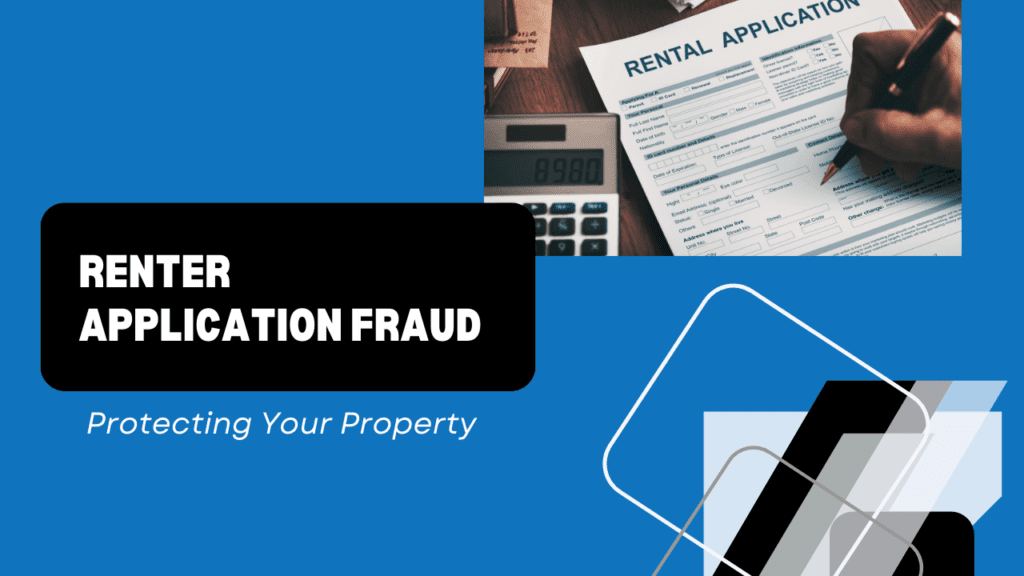
Finding a reliable tenant should be as easy as collecting applications and screening them against your criteria.
But, it’s rarely that easy.
You likely expect every applicant to be cooperative, honest, and transparent. Unfortunately, rental application fraud is on the rise, and it can be very costly for owners in time and money.
We work with owners who are renting out a single home and real estate investors with an entire portfolio of properties, and all of them struggle to protect their investments against dishonesty and fraud.
Understanding how to identify and prevent this type of behavior is an important part of placing a qualified tenant and enjoying a pleasant and profitable rental experience.
So let’s look at the fraud, figure out how to spot the red flags, and put together some best practices that will protect your rental.
Defining Renter Application Fraud
Application fraud occurs when a tenant interested in renting your property provides false, altered, or misleading information on a rental application. The intent is usually to qualify for a property they wouldn’t otherwise be eligible for due to poor credit, insufficient income, or a problematic rental history.
In our experience as Kansas City property management experts, we’ve found there are two primary types of rental fraud:
- Identity Fraud. The applicant uses someone else’s identity or creates a fake one to pass background checks.
- Income/Employment Fraud. The applicant falsifies pay stubs, bank statements, or employer references to meet income requirements.
These deceptive practices can lead to unqualified tenants moving into your property, making it much harder to enforce lease terms and increasing your financial risk.
Why Is Rental Fraud on the Rise?
Several factors contribute to the increase in rental fraud. For starters, everyone has access to impressive technology. Falsifying documents can be done on a smart phone. While online applications are far more efficient and complete, they’ve made it easier for applicants to submit fraudulent documents without verification.
This is also a tight and competitive rental market. Applicants know they are fighting a lot of qualified renters for the best rental homes in the area. That can lead to lies.
Generally speaking, DIY owners are most often victimized by fraud and dishonesty. Independent property owners may lack the tools or experience to identify fake documents or red flags. This allows bad applications to slip through the cracks, especially if screening procedures aren’t as strict as they should be.
The Hidden Costs of Rental Fraud
Rental property owners need to understand that letting a fraudulent applicant into your property can have serious consequences. You may be dealing with unpaid rent. If a tenant lied about their income, they may quickly fall behind on payments. This could lead to evictions, which are costly and time consuming. Not to mention stressful.
You may have to go through the leasing process all over again, too, and this time with lost revenue and additional wear and tear on your property. Taking preventive steps before handing over the keys is so essential.
Common Red Flags on Rental Applications
So, what are we looking for? Here are some signs that should prompt further investigation:
- Inconsistent or Missing Information. Gaps in employment or unclear rental history should raise questions.
- Generic or Vague Employer Contact Info. A listed phone number that leads to a personal cell instead of a company HR line could be fake.
- Perfect Credit or High Income with No Rental History. If it sounds too good to be true, it probably is. Investigate further.
- Rapid Move-In Requests. Applicants who are in a hurry may be trying to avoid thorough screening.
- Documents That Look “Off.” Pay stubs, tax forms, or ID cards with odd formatting or typos may be altered or entirely fabricated.
How to Protect Yourself from Renter Fraud
Always follow the same process for every applicant. This includes:
- A completed rental application
- Identity verification (e.g., government-issued photo ID). Don’t rely on just a visual check of the ID. According to law enforcement, thieves tend to steal ID’s that look like themselves.
- Credit and background check
- Employment and income verification
- Rental history and references
By applying consistent criteria, you reduce the chances of bias or missing red flags.
We also recommend that you leverage a professional property manager’s expertise and professional tenant screening tools. We are quick to detect common fraud tactics, such as altered documents or mismatched identities.
Ask for recent pay stubs, W-2s, or bank statements—but don’t stop there. Call the employer directly using contact info from a trusted source (e.g., LinkedIn or the company website). Ask specific questions to confirm employment details. Be wary of unverifiable self-employment income or unverifiable online businesses. If the applicant is self-employed, request tax returns or profit-and-loss statements from a CPA.
- Check ID Carefully
Identification is especially important. When you ask for an ID, compare it to the name on their application and credit report. Watch for:
- Altered or fake IDs
- Mismatched names or birth dates
- Inconsistencies between ID and other submitted documents
ID verification software can help confirm whether a driver’s license or passport is legitimate.
- Verify Rental History
Speak directly to past owners and property managers. Ask detailed questions such as:
- Did they pay rent on time?
- Did they receive any complaints?
- Would you rent to them again?
Fake owner references are not uncommon, so confirm contact details independently—never just use the numbers provided on the application.
Remember to document everything. Keep detailed records of all communications, applications, and documents. This protects you if you need to justify why an applicant was denied, it helps you avoid fair housing violations, and it keeps all of your necessary details in order if you have to pursue eviction or want to identify fraud patterns over time.
Application fraud isn’t just a headache, it’s a threat to your financial stability and peace of mind. But with the right systems, tools, and vigilance, you can minimize the risk and lease with confidence.
 As an owner, protecting your property means protecting your tenant screening process. If you’re struggling to provide an application that protects your property and still gathers all of the necessary information for screening, we’re prepared to help. Contact us at Key Partners Property Management for any support you need with your Kansas City rental homes.
As an owner, protecting your property means protecting your tenant screening process. If you’re struggling to provide an application that protects your property and still gathers all of the necessary information for screening, we’re prepared to help. Contact us at Key Partners Property Management for any support you need with your Kansas City rental homes.

 First & Last Name
First & Last Name